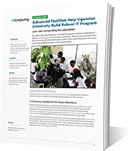CASO DE ÉXITO
Advanced Facilities Help Ugandan University Build Robust IT Program
Low-cost computing for education
The staff at Nkumba University, one of the few private chartered universities in Uganda, was facing an administrative nightmare. With a limited number of PCs and a university full of students eager to learn, how could they ensure that every student had sufficient access to the computer labs?
Budget restrictions, growing maintenance and electricity costs highlighted the need for an innovative solution to address the challenges that this progressive university faced.
IT Resources Suitable for the Future Workforce
Nkumba University’s Department of Computing and Information Technology (CIT) offers a wide range of IT training that enriches both the students and the country at large. Courses include information technology, infrastructure, software development, hardware troubleshooting, e-commerce, and research. The university needed to provide a first-class computing solution on par with its courses, but was daunted by the rising cost of maintaining their computer labs.
“For a progressive center of excellence such as ours, we need to understand and embrace innovative technology deployments like NComputing. Our priority is in providing a high standard of education for our students. We are training the next generation of the Ugandan workforce and need to equip them with the knowledge to rival our African, American, and European counterparts,” explained Mr. Lusiba Badru, Head of the Department of CIT.
An Innovative Solution At an Affordable Price
“We knew that we wanted to enable as many students as possible to access the computers, but feared our budget would limit the choices available to us. However, when Intelligent Solutions introduced NComputing to us, we were surprised that they were so cost-effective—not only in the initial set-up, but also on an ongoing basis. Since implementing the installation, we have found that our students have a better computing experience.

Students at Nkumba University work in groups.
Thanks to NComputing, we can accommodate more users—plus we can maintain more control over what the students access or how they use the systems. This additional management functionality has resulted in less friction in the labs and a better studying environment,” adds Mr. Badru.
Sharing the Power of One PC
The NComputing solution works because today’s PCs are so powerful that the vast majority of applications only use a small fraction of the computer’s capacity. NComputing vSpace™ virtualization software taps into this unused capacity so that it can be simultaneously shared by multiple students. The NComputing virtualization software works with standard Windows and Linux PCs, and each student’s monitor, keyboard, and mouse connect to the shared PC through a small and highly reliable NComputing access device. The device itself has no CPU, memory, or moving parts, so it’s easy to deploy and maintain. By spreading out the cost of the shared computer, schools can provide up to five times the number of seats for the same money.
With one PC connected across a standard ethernet network, NComputing L-series access devices can support up to 30 simultaneous users. Rather than purchasing, maintaining, and managing 30 individual PCs, all the university needs to do is manage one PC. Connectivity via the Ethernet network means that users can be situated as close to, or as far away from, the shared PC as required. If security is an issue, then the shared PC can be stored behind locked doors.
The Future Looks Bright for Nkumba
“We saved significant funds by purchasing the NComputing devices rather than traditional PCs,” explained Mr. Badru. “Our initial installation project is going very well. We are planning to roll this system out across all of our offices and computer labs.”
Suggested reading





